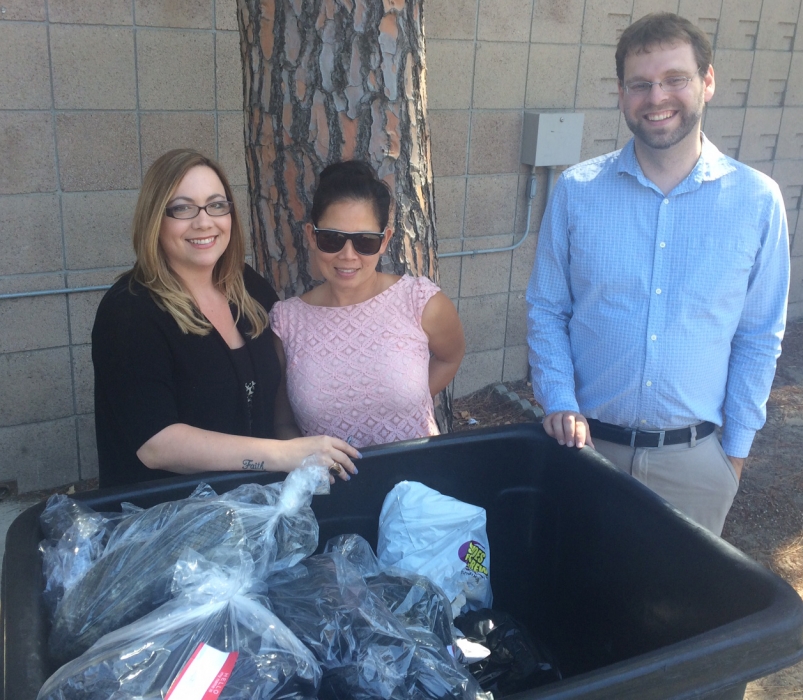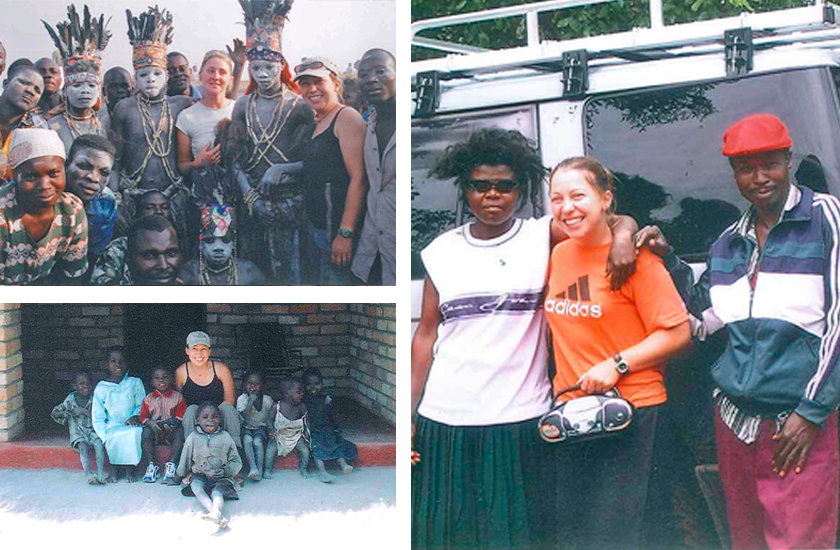The Next STEP in Recycling

Editor's Note: In one of our lively Homefront brainstorming meetings, Mark Rousseau told us about Residential Dining Services sending their employees' work shoes to Africa to be reused, and Danielle Reed regaled us with charming stories of her time spent in Africa. We realized they were sharing different threads of the same overall story, so we've combined them here. Keep reading and enjoy!
Residential Dining Going the Extra Step
Braving the hazards of stinky shoes, Residential Dining Services, partnering with a local textile recycling company T-Waste Solutions, has undertaken a shoe recycling program for the 2015-16 school year. To date, Dining has recycled approximately 350 pairs of shoes, totaling 750 lbs. This has kept shoes out of the landfill and, even better, the shoes are being delivered to Togo, a West African country.
Tom Spiva, Desirea Lewis, Margarita Dalzell, and Melissa Cordial, the Office Managers at each Dining Commons, have been collecting shoes every six months when employees receive replacements for their no-slip work shoes. Once collected, T-Waste Solutions picks them up and bales them for shipment to West Africa where they will be used by people from Togo who may not have access to good footwear.
T-Waste has been recycling textiles for 20 years in the tri-county area, and has partnered with H&RS for a couple of years now. They have sent hundreds of used Housing work shirts to Africa. Special thanks to Chris Mkpado of T-Waste for his help in reducing waste, and helping out people in West Africa, and to Dining for going the “extra step” in recycling more items!
By Mark Rousseau & Tom Spiva
Salaula Fashion
From 2002-2004 I served as a Peace Corps Volunteer Zambia, Africa. I lived in a mud hut in a small village named Kachila, and taught local subsistence farmers how to raise fish as an added source of protein in their diet. I lived with the Bemba tribe, and loved getting to know the warm, welcoming people and their simple way of life. Most of my friends and neighbors grew their own food, and made a small amount of money selling beans to traders who came in from the larger cities. The little bit of money they had was used primarily for cooking oil and soap, and there was not a lot left over for clothes or shoes.
Most of my villagers purchased clothes from second hand markets, called “salaula.” The word is translated as “to pick, rummage, sort through a pile,” and what I learned is that many clothes that are donated here in the US are bundled up and sent to Africa. These bundles are then purchased by vendors who sell the clothes in individual markets throughout the country. In this manner my villagers were able to inexpensively cloth themselves to fit their own unique fashion sense. Some of my favorites were a Prince Concert shirt, and a young kid wearing a shirt that says “here comes trouble.” I scored an awesome Harley Davidson shirt that I wore when I wanted to look tough.
Footwear was also very expensive, and those who could afford a pair of real shoes wore them only on special occasions. Most kids went barefoot, and adults wore cheap rubber flip flops called “amatropicals.” Soccer was huge in my village, and our local team would compete with other village teams at the nearby school. Many of the kids playing went completely barefoot, but some of the kids would put their money together and share a pair of cleats – one would wear the right shoe and the other the left!
One of the things I truly appreciated about life in Zambia was the low amount of waste. Everything was used over and over again. Women would wear citenges (bright colorful strips of fabric) as skirts, and then to carry babies tied to their backs, and then as rags. Empty soda and beer bottles were exchanged for full ones. Bottles, jars, and other containers would be used over and over again to hold cooking oil, kerosene, or anything else bought in bulk. Once I threw mesh onion sacks in my trash pile, and two days later kids in my village were wearing them as hats!
I am excited about Residential Dining’s efforts to recycle shoes and shirts by sending them to Togo. I love that now that I am back in the states I am still a part of an organization that values sustainability, and cares for people in need.
Natotela sana, Residential Dining!
(Thank you very much, Residential Dining!)
By Danielle Reed
